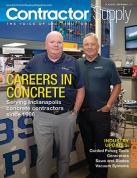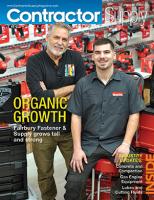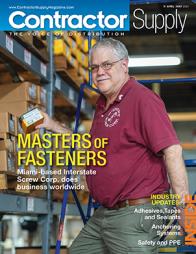New concrete line resists cracking
BASF ZERO-C concrete promises virtually crack-free performance.
BASF Construction Chemicals has invented a new kind of concrete that it says will transform the $20 billion repair construction industry, because once it sets, it's virtually crack-proof.
BASF says its "ZERO-C" (zero-cracking) line of concrete is a stronger and more durable alternative to the mortars that usually repair - and re-repair - crumbling historic buildings and other older structures.
"This is like finding the cure for cancer for our industry," marveled Peter Emmons, founder and chief executive of Structural Preservation Systems, a specialty repair contracting company in Hanover, Md.
"It's pretty ground-breaking for restoration construction, taking concrete and actually improving its performance," agreed Dilip Choudhuri, principal and executive director of structural diagnostics services for Walter P. Moore engineering firm in Houston, Texas, which repairs bridges, stadiums and buildings.
ZERO-C will also be available for contractors repairing residential driveways, sidewalks, balconies and other projects.
The construction industry has spent decades looking for materials that won't crack when they are used to repair and reinforce older materials, because even hairline cracks can let in pollutants and start disintegrating the concrete.
"The goal of our industry is to stop repairing the repair," Emmons said.
A 2006 industry summit challenged construction companies to come up with a solution, and BASF appears to be the first manufacturer to have done it, he said.
Research scientists at BASF Construction Chemicals, a division of the mammoth BASF SE German chemical company, spent years quietly creating prototypes, tinkering with the formula, and developing tests to simulate environmental conditions and exceed industry standards.
BASF invited 40 top engineers from around the U.S. and Canada to its Beachwood headquarters on Wednesday under the guise of showing them a new product, but didn't tell them what they'd come up with until Thursday morning, said Doug MacRae, vice president and business director.
While high-performance concrete tends to crack within a few days because it shrinks as it cures, Heather See, a BASF senior scientist and civil engineer, has samples of ZERO-C in her laboratory that have resisted cracking for more than 120 days after being poured.
The gray rings of concrete still look smooth and pristine, despite the fact that other kinds of concrete subjected to the same stress tests crack after 5 to 20 days.
Out in the parking lot, Robin Bellamy, BASF's manager of technical service, stood on a slab of concrete as workers poured ZERO-C into a wooden trench around his feet and smoothed out the top with a metal trowel.
"Even in this hot temperature, this material is going to be fine," he said.
He invited the engineers to examine an identical slab of concrete surrounded by ZERO-C prepared 10 days ago.
"We've replicated this time after time after time, and we've never had a failure yet," he said, referring to its smooth, crack-free surfaces.
"You can strike it, leave it, walk away, and feel confident in the ZERO-C."
To ensure that the construction crews get the same performance out in the field, BASF is packaging ZERO-C in durable, recyclable, pre-measured pouches of dry mortar and cement components and liquid materials.
So all they have to do on site is rip open the pouches, combine the ingredients, mix for two minutes and use, MacRae said.
Choudhuri said that when he first heard the name "ZERO-C," he thought it stood for reducing the carbon footprint, or environmental impact, of construction work. But "ZERO-Cracking" concrete is even better, he said.
"I'm looking forward to actually using it in our projects and seeing for myself how it performs," he said.
ZERO-C Technology
-- A line of specially formulated cement-based repair mortars tested to resist cracking for more than 60 days - triple the duration of similar materials.
-- Invented by scientists at BASF's North American Construction Chemicals' research laboratories in Beachwood
-- Available to contractors on June 1
-- Packaged in weatherproof, collapsible, recyclable pouches that let workers mix dry materials with different pre-measured liquids according to the demands of the project. The pouches use 50 percent less plastic than jugs.
-- Costs about 5 percent more than what's currently on the market
SOURCE: BASF Construction Chemicals















